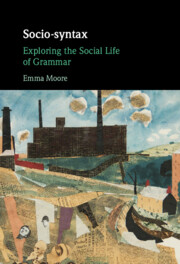Book contents
- Socio-syntax
- Socio-syntax
- Copyright page
- Dedication
- Contents
- Figures
- Tables
- Acknowledgements
- 1 Why Does the Social Meaning of Grammar Matter?
- 2 The Social Landscape of Midlan High
- 3 How Do We Study the Social Meaning of Grammatical Variation?
- 4 How Free Are We to Vary the Grammar We Use?
- 5 How Do We Use Grammar to Design Our Talk?
- 6 Does Everyone Use Grammar to Make Social Meaning?
- 7 How Does Grammar Combine with Other Elements of Language?
- 8 What Does It Mean to View Grammar as a Fluid, Flexible Social Resource?
- References
- Index
4 - How Free Are We to Vary the Grammar We Use?
Published online by Cambridge University Press: 19 October 2023
- Socio-syntax
- Socio-syntax
- Copyright page
- Dedication
- Contents
- Figures
- Tables
- Acknowledgements
- 1 Why Does the Social Meaning of Grammar Matter?
- 2 The Social Landscape of Midlan High
- 3 How Do We Study the Social Meaning of Grammatical Variation?
- 4 How Free Are We to Vary the Grammar We Use?
- 5 How Do We Use Grammar to Design Our Talk?
- 6 Does Everyone Use Grammar to Make Social Meaning?
- 7 How Does Grammar Combine with Other Elements of Language?
- 8 What Does It Mean to View Grammar as a Fluid, Flexible Social Resource?
- References
- Index
Summary
How stylistically sophisticated can the use of morpholexical/morphosyntactic variation be? By focusing on the range of social meanings that can be articulated by ‘levelled were’ (e.g., she were funny) – a regionally restricted variant of the type most frequently studied in sociolinguistics – this chapter explores the extent to which social meanings are fixed by a variant’s enduring association with place. It first considers how children acquire linguistic variation and the extent to which this process interacts with their ability to vary grammatical items stylistically. The analysis then explores how levelled were patterns by social class, parental place of birth, and community of practice at Midlan High. It provides evidence that all of these factors play a role in the use of levelled were, but that the most robust correlation is with community of practice. This data is used to argue that grammatical variants can mark distinctive social styles and personas, and that speakers can adapt their use of variation providing that (i) they have access to a range of variants, and (ii) that they are motivated to use them by virtue of its utility to them as a social symbol.
Keywords
- Type
- Chapter
- Information
- Socio-syntaxExploring the Social Life of Grammar, pp. 75 - 110Publisher: Cambridge University PressPrint publication year: 2023

